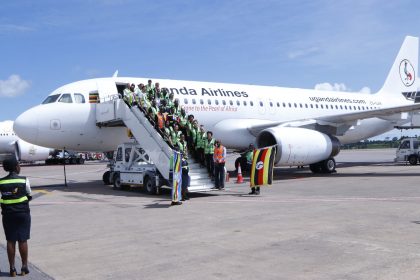Helping bottom-layer businesses surmount Covid-19, propels Equity Group revenues past USD 1 billion mark

A bottom of the pyramid-centric strategy that helped MSME’s to weather and sustain growth during the worst of the Covid-19 pandemic, helped regional lender Equity Bank, nearly double its net profit during calendar 2021.
The lender reported a 99pc growth in profit after tax to Kshs 40.1 billion, almost doubling the Kshs 20.1 billion recorded in 2020. Pre-tax profit swelled 134pc to Kshs 51.9 billion from Kshs 22.2 billion the previous year, reflecting improved top of the line growth and operating efficiency.
Earnings per share jumped 98pc to Kshs 10.40 from Kshs 5.20 for the comparable period in 2020. The board has recommended a dividend of Kshs 3 per share – a 50pc increase that will see the total pay-out reaching Kshs 11.3 billion.
Net interest income grew a quarter to Kshs 68.8 billion from Kshs 55.1 billion the previous year, boosted by a 23pc tailwind in the loan book that rose to Kshs 587.8 billion from Kshs 477.8 billion the previous year. Earnings from government paper and securities grew 81pc to Kshs 394.1 billion up from Kshs 217.4 billion while non-funded income jumped 15pc to Kshs 43.6 billion up from Kshs 37.8 billion on the back of trade finance, payment channels and foreign exchange trading income. Trade finance registered a 55pc growth yielding Kshs 3.2 billion in revenue from the previous Kshs 2.1 billion.
“Despite zero rating mobile transaction offerings, transaction income grew by 37pc to Kshs 10.4 billion up from Kshs 7.6 billion on the back of E-commerce and Merchant banking business. Foreign exchange trading income grew by 33pc to Kshs 8.3 billion up from Kshs 6.2 billion driven by diaspora inflows that grew 37pc to reach Kshs 383.5 billion up from Kshs 279.4 billion, the bank said.
Total income grew by 21pc to breach the USD 1 billion milestone to a record Kshs 112.4 billion up from Kshs 92.9 billion the previous year. Despite a 24pc surge in staff costs to Kshs 19.1 billion, growth in other operating costs to Kshs 36.5 billion up from the Kshs 30.6 billion, the bank made gains in cost efficiency when overall costs shrunk 16pc to Kshs 60.5 billion down from Kshs 71.9 billion. This was driven by an 81pc decline in loan loss provision to Kshs 4.9 billion down from Kshs 25.9 billion the previous year. Portfolio at risk also declined to 8.3pc down from 11pc with non-performing loan coverage increasing to 98pc up from 89pc. Overall, however, total non-performing loans declined to Kshs 44.5 billion down from Kshs 50.6 billion.
Total Assets grew by 29pc to Kshs 1.305 trillion up from Kshs 1.015 trillion driven by a corresponding 29pc growth in customer deposits to Kshs 959 billion up from Kshs 740.8 billion. Surplus cash was then deployed into low yielding government securities at 9.6pc, while cost to income remained fairly constant at 49.1pc up from 48.5pc.
Return on Average Equity expanded to 26.1pc up from 15.3pc while Return on Average Assets grew to 3.5pc up from 2.3pc on the back of benefits of economies of scale and efficiencies of digitisation and a shift of business model from fixed costs to variable cost resulting in the enhanced returns.
“The bulk of customers’ engagement and consumption of banking products and services is now on digital channels of internet and mobile on self-service devices delivering 24-hour banking experience and convenience. Banking has largely shifted from where you go to what you can do on your devices compressing geography and distance,” the bank said.
The group says its twin strategy of pursuing growth while minimising risk, had led it to secure the future through customer consolidation. The group has diversified into a systemic regional business in six countries with the dominant market in Kenya contributing only 59pc and 63pc of the assets and revenues respectively.
“We have strengthened our business model to achieve an embedded shared value concept in our twin engine of social and economic aspirations and deliverables. We have scaled our social and environmental impact investments in capacity building and enhancement through education, health, and entrepreneurship training,” said Group MD and chief executive Dr James Mwangi, adding: “We have strengthened our participation in formalising and integrating the informal sector in the real economy with the formal supply chains and ecosystems of agriculture, micro, small and medium enterprises.”
The Group has launched the ‘Africa Recovery and Resilience Plan’ a Marshall Plan with a seed fund of USD 6 billion to act as a stimulus for the private sector. Dr Mwangi says the plan is built on a platform of collaboration and cooperation for Public Private Partnerships to transform the region through value addition and ecosystem development in the five areas of: Primary sectors of Food and Agriculture, and extractive sectors, Manufacturing and Logistics, Trade and Investments, Micro Small and Medium Enterprises and Social and Environmental impact investments.
Through its rather audacious strategy, the bank aims to finance 5 million businesses and 25 million households to reach 100 million people in Africa and to create 50 million jobs both directly and indirectly.
“We are optimistic that the ‘Africa Recovery and Resilience Plan’ holds great promise for Africa’s socio-economic prosperity and Equity Group is well positioned to catalyse this outcome,” says Mwangi.

 Brussels Airlines to announce Nairobi service
Brussels Airlines to announce Nairobi service
 SITA promises enhanced travel experience after Materna acquisition
SITA promises enhanced travel experience after Materna acquisition
 Saudia’s 105 aircraft order stretches A320neo lead over rival Max
Saudia’s 105 aircraft order stretches A320neo lead over rival Max
 Boeing refuses to pay hackers $200 million for stolen Data
Boeing refuses to pay hackers $200 million for stolen Data
 Uganda-Tanzania announce date for second joint business forum
Uganda-Tanzania announce date for second joint business forum
 Uganda Airlines leased A320 arrives in Entebbe
Uganda Airlines leased A320 arrives in Entebbe
